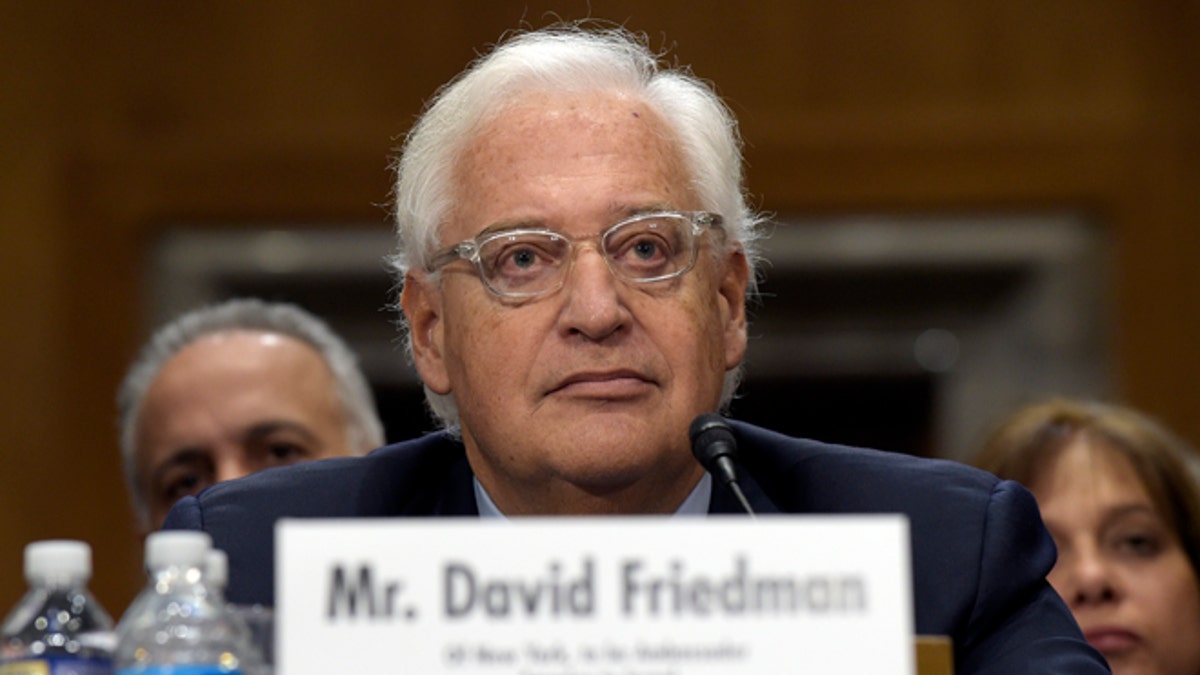
David Friedman, nominated to be U.S. Ambassador to Israel, testifies on Capitol Hill in Washington, Thursday, Feb. 16, 2017, at his confirmation hearing before the Senate Foreign Relations Committee. (AP Photo/Susan Walsh) (Copyright 2017 The Associated Press. All rights reserved.)
President Trump’s nominee to be U.S. ambassador to Israel faced tough questioning from Democrats at his confirmation hearing Thursday about everything from past controversial comments to his stance on the so-called two-state solution.
The heated hearing captured an intense debate playing out over his nomination, in editorial pages and newspaper ads across the country. David Friedman is the latest Trump nominee targeted by Democrats, after they helped pressure labor secretary pick Andrew Puzder to withdraw from consideration on Wednesday.
“Frankly, the language you have regularly used against those who disagree with your views has me concerned about your preparedness to enter the world of diplomacy,” Ranking Democratic Sen. Ben Cardin of Maryland told Friedman on Thursday.
The bankruptcy lawyer was not only grilled by Democrats on the Senate Foreign Relations Committee but heckled by pro-Palestinian protesters.
He showed contrition, though, about some of his past remarks -- specifically having called supporters of the liberal Jewish lobbying firm J Street worse than "kapos," a term typically used to describe Jews who worked with Nazis in concentration camps.
“There is no excuse. If you want me to rationalize it or justify it, I cannot. These were hurtful words and I deeply regret them. They are not reflective of my nature or my character,” Friedman said Thursday.
On Wednesday, J Street issued a statement asserting a possible apology will not “at this stage in Mr. Friedman’s career will change the fact that his views, his actions and his temperament should disqualify him.”
The criticism, though, does not mean the nomination is in jeopardy. Republicans mostly asked Friedman about policy, and he was introduced by South Carolina GOP Sen. Lindsey Graham, who said despite disagreements on some issues he never doubted the nominee's commitment to Israel.
Republicans on the panel also praised Friedman’s longstanding support of Israel. Florida Republican Sen. Marco Rubio described Democrats’ relentless questions about his prior statements as “unreal.”
Democrats indeed directed their focus on Friedman’s firebrand rhetoric, including describing Bill Clinton as “more dangerous to the interests of Israel than any president since Eisenhower” and arguing the Obama administration was more interested in fighting Republicans than terrorists.
Friedman said his comments were indefensible, but argued he recognizes there is an “important difference between a political contest and a diplomatic mission.”
The one-time lawyer to Trump was pressed about his public skepticism toward a two-state solution, in the context of remarks made by the president in his joint press conference with Israeli Prime Minister Benjamin Netanyahu.
Breaking away from longstanding U.S. policy, Trump said he was not wedded to the idea of separate Palestinian and Israeli states.
“I thought for a while the two-state looked like it may be the easier of the two. But honestly, if Bibi and if the Palestinians ... are happy, I’m happy with the one they like the best,” he said Wednesday.
In an interview with The New York Times, Trump declined to “specifically address the issue.” When pressed, Trump admitted to “basically” supporting the position.
Friedman has inspired an intense lobbying campaign that reflects deeper divisions within the Jewish community.
Working to support him, Christians United for Israel (CUFI), the nation’s largest pro-Israel organization, took out full-page ads in several newspapers this week backing Friedman.
"This nomination cannot get bogged down in petty bickering or sour grapes over the results of the election. Trump is the President, Friedman is the nominee, and the Senate needs to let them do their jobs,” CUFI Action Fund Washington Director Gary Bauer said in a statement.
The New York Times editorial board, meanwhile, predicted the confirmation of Friedman would ‘provoke conflict in Israel” and “undermine American leadership” in the Middle East.
In a letter, former ambassadors Thomas Pickering, William Harrop, Edward Walker, Daniel Kurtzer and James Cunningham maintained Friedman’s “extreme, radical positions” made him “unqualified” to serve as ambassador.
A confirmation vote has yet to be scheduled.




